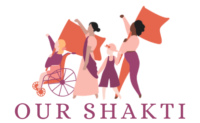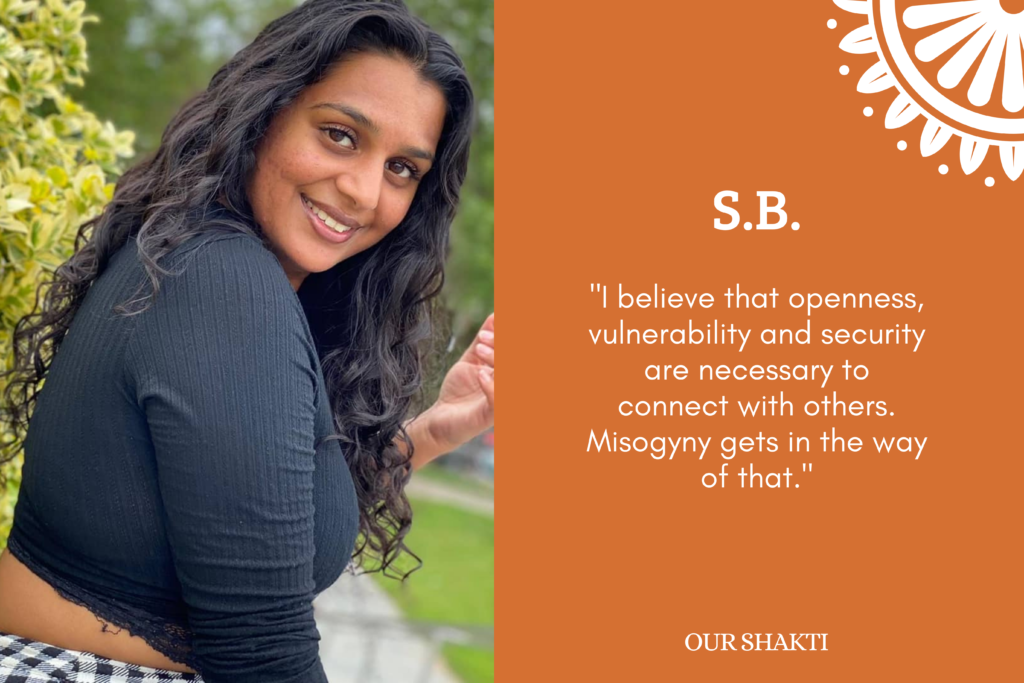The interview of the month is about fighting misogyny in society. The interviewee will tell us about this from a cultural perspective (Surinamese-Indian). However, note that misogyny is a widespread phenomenon and not linked to a specific culture. It occurs in all cultures in every part of the world.
Misogyny is hatred of, aversion to, or prejudice against women. Although misogyny is often discussed in relation to men, misogyny also occurs among women. Today, we will zoom in on misogyny among women. Why? Because women are also called the “gatekeepers of the patriarchy.” Due to their behavior, they perpetuate inequalities between men and women. Misogyny leads to the humiliation and objectification of women, and the subjection of women to violence.
Today I’m interviewing S.B., a smart woman who will tell us more about her experience with misogyny. In her spare time, she likes to dance, read and travel. She likes to invest time and energy in connecting with people. This gives her a sense of fulfillment.
S.B., why do you think it is important to discuss this topic?
I think it is important to be able to connect sincerely with people. I believe that openness, vulnerability, and security are necessary to connect with others. Misogyny gets in the way of that. It hinders genuine connection. It takes a lot of courage to bring about change. It starts with being brave enough to take up the fight. It is courageous to go against everything you know and the “norm”.
Can you share your personal observations on misogyny?
Mainly being critical of each other, gossiping, forming cliques, and laughing at each other.
For example, I have noticed that conversations focused on status are being held about others. If there has been a family gathering, there will be a follow-up discussion. Who is doing well or badly, they have this type of car, education or house. Something I often heard was, “Oh, she has a good husband because he is highly educated and he has a good job.” I don’t think that says anything about the goodness of a man, I mean he can be an alcoholic and violent.
Because of the image I have, I do not associate with Surinamese-Indian women. There are hardly any Surinamese-Indian women in my group of friends. Perhaps one acquaintance. The image I have hinders me to connect with other women, I assume in advance that there will be a negative mentality. Once I put my prejudices aside and gave someone the benefit of the doubt. I had a Surinamese-Indian friend at the time, but that experience confirmed the image I already had. It went as expected.
Why do you think women like behave this towards each other?
I think it’s been passed down from generation to generation. These are the examples I grew up with. And it is also shown in Indian soaps. I am talking about the mother-in-law, daughter-in-law, or sisters-in-law interact with one another. For example, conspiring to kick out a daughter-in-law or to put her in a bad light in front of her husband.
When I watch Indian soaps I immediately turn it off when they show these type of things, because I think it’s nonsensical. It is toxic and misogynistic. Do you think soaps influence people’s behavior?
It’s normalizing for women to be hostile to each other. I sometimes get questions from people with different cultural backgrounds about why Surinamese-Indian people are manipulative. That is stereotypical for Surinamese-Indian people apparently.
It has to do with status, wanting to feel better than the other. In general, I think the Surinamese-Indian culture is an oppressed culture where there is a lot of struggle and suffering. I don’t think it’s normalized to discuss such things and to be vulnerable in this. I think people are afraid that it could be used against them or that they could be taken advantage of.
What do you mean by oppressed culture?
That many things are not discussed internally. Things are avoided. Or you are expected to participate in a dysfunctional environment.
Do men play a role in this?
I think so because there are expectations of how women should behave. And I think men contribute by talking about women among men.
What are the consequences of misogyny on a personal and societal level?
You don’t have sincere relationships with each other. You don’t support each other. You cannot connect securely. Or you don’t dare to make yourself vulnerable, so you wear a mask and adopt a hardened attitude.
It affects a woman’s self-confidence. If you have a support system made up of women who support you and who you can trust, it has a different effect on you compared to having nieces, sisters-in-law, mother-in-law, aunts around you that you can’t trust.
I also think it has implications for women on a societal level. If you have female colleagues who are against you, it can affect your career. You are then begrudged a certain position or they will give you a hard time in the workplace. This way you cannot grow in your position. Unlike men who succeed, because they do not have that resistance (to a lesser extent).
It actually strikes me that, for example, I was never taught how to distance myself from such behavior when others exhibit it. For example, if someone gossips, then I have not learned to say: I have no need to talk about this. Most people listen and/or join in the conversation. Did you experience the same?
My mother told me not to associate with certain people. Sometimes I just listen and leave the person in his/her worth. But I’m not going along with them. There are times when I indicate that it is not relevant to me. Before, I used to join the conversation.
Great that you already notice a behaviour change in yourself. How could today’s generation stop misogyny?
We have been influenced by soaps in which misogyny is normalized. Some people take this on and pass it on in their upbringing. To stop this, awareness is needed. We need to become aware of how we interact with women in our community and the harmful impact this has on women. Start with yourself. Check with yourself whether this is something you want to contribute to and continue or whether you want to stop it.
Suppose misogyny doesn’t exist, but love for women does. What would that look like in your eyes?
Being available to each other. When you feel that people are available, love you, and stand by you, you will blossom. You are more confident. You help others. You dare to show up as you are. You feel safe enough to be who you are and because of that, you can truly connect with others.
I also think you’re more likely to share insecurities with other women. Exchanging thoughts, asking for help or advice on everyday matters such as parenting, partners, relationships, etc. It is important for women in the workplace to be able to trust female colleagues, as women are generally in a vulnerable position as we are more likely to experience sexual harassment compared to men. If you have female colleagues around you who are underhanded, you don’t dare go to them with your story for support. Moreover, you do not find out if it happens to other colleagues. This allows perpetrators to continue to abuse women and maintain their power. For this reason alone, I think it’s important that misogyny among women stops. Why do you think it is important that misogyny ends?
What does it bring? It just creates disconnection. That you are far apart from one another.
And when it comes to our community, why is it important that it stops? I think it causes you to distance yourself from the culture and from the people who belong to the community. While some elements of the culture are very beautiful and it is not a given that all Surinamese-Indians behave that way.
Yes, I feel like I miss things about the culture. It’s different with people from my own culture. I have a close relationship with my friends. I can explain things to them about my culture and they’ve been with my family, but maybe they just don’t understand it entirely.
Do you wish to share something else?
I think Our Shakti is a great initiative. Cool name. And the fact that you have created a platform for women where you discuss matters that apply to Surinamese-Indian women in particular. I think it says something about the emancipation of Surinamese-Indian women in the Western world that platforms are being started to draw attention to issues that we women encounter. I think it’s beautiful and important. I support this!

